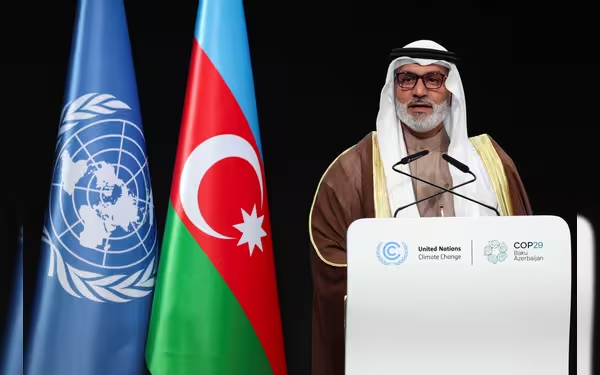Thursday, November 21, 2024 07:28 AM
OPEC Chief Advocates Fossil Fuels at COP29 Climate Summit
- OPEC chief calls oil a 'gift from God'.
- Climate goals achievable without abandoning fossil fuels.
- Urgent climate crisis demands sustainable energy solutions.
 Image Credits: arabnewspk
Image Credits: arabnewspkOPEC's Haitham Al-Ghais defends fossil fuels at COP29, emphasizing their role in achieving climate goals.
At the recent COP29 climate summit held in Baku, OPEC Secretary-General Haitham Al-Ghais made a bold statement regarding the role of fossil fuels in our world. He referred to crude oil and natural gas as a "gift from God," emphasizing that discussions surrounding global warming should prioritize reducing emissions rather than eliminating specific energy sources. This perspective aligns with the sentiments expressed by Azerbaijan President Ilham Aliyev, who also defended his country’s oil and gas industry during the summit.
Al-Ghais passionately articulated the importance of fossil fuels, stating, "They impact how we produce and package and transport food and how we undertake medical research, manufacture, distribute, medical supplies. I could go on forever." His remarks highlight the integral role that oil and gas play in various sectors, from agriculture to healthcare.
During the summit, Al-Ghais pointed out that the global community could still meet its climate goals without completely abandoning petroleum. He reminded attendees that the Paris Agreement, established in 2015, focuses on reducing emissions rather than dictating which energy sources should be used. This assertion raises an important question: Can we balance our energy needs with the urgent requirement to combat climate change?
Supporting this viewpoint, Mohamed Hamel, the secretary-general of the Gas Exporting Countries Forum, echoed similar sentiments. He argued that as the world’s population continues to grow and economies expand, the demand for natural gas will only increase. Hamel expressed hope that a COP29 agreement on international climate finance would pave the way for supporting natural gas projects, which could help countries transition from more polluting fuels like coal.
However, the urgency of the climate crisis cannot be overstated. Climate scientists warn that the world is on track to exceed the critical 1.5 degrees Celsius threshold by the early 2030s, potentially leading to catastrophic impacts. Current projections suggest that we could see a rise of up to 3.1 degrees Celsius by the end of this century if significant changes are not made.
While the arguments presented by OPEC and gas exporters highlight the importance of fossil fuels in our current energy landscape, it is crucial to consider the long-term implications of continued reliance on these resources. The challenge lies in finding a sustainable path forward that balances economic growth with environmental responsibility. As we navigate this complex issue, it is essential for all stakeholders to engage in constructive dialogue and seek innovative solutions that ensure a cleaner, more sustainable future for generations to come.













